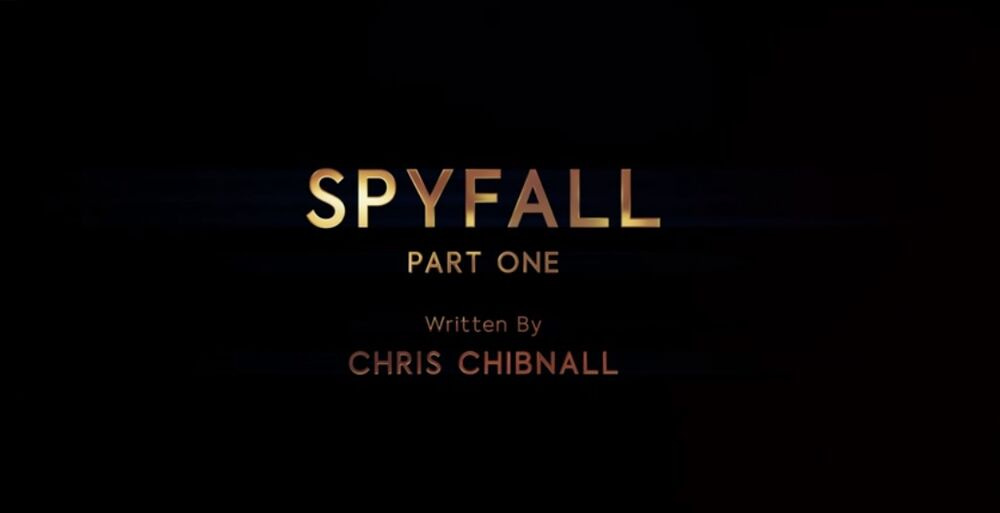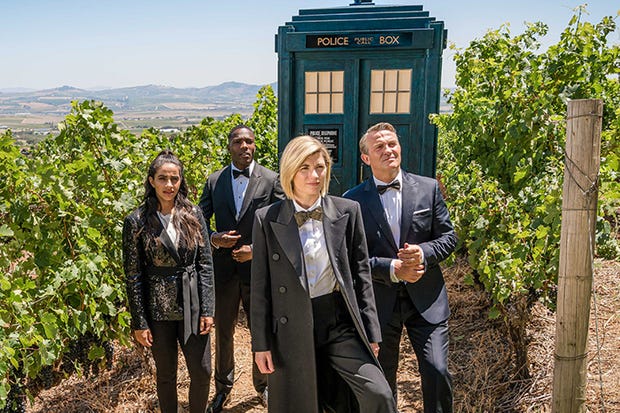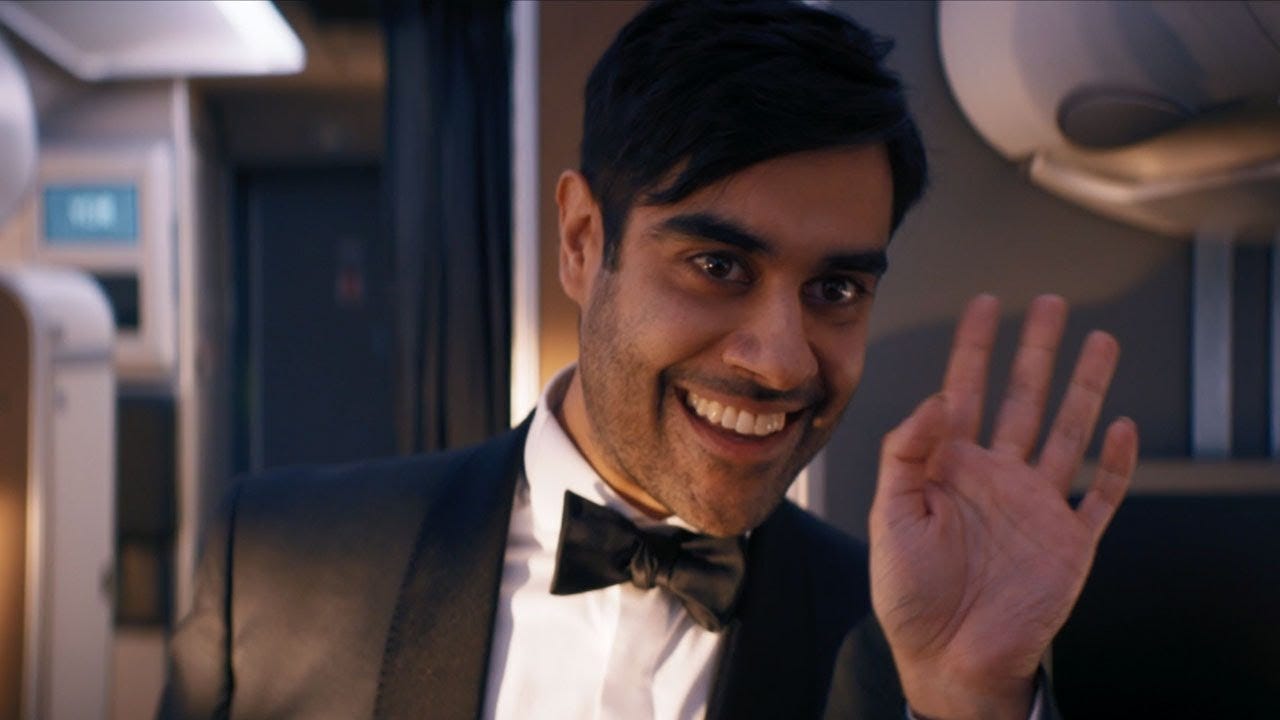A Masterful Return
Doctor Who's Series 12 makes a grand and thrilling entrance in “Spyfall: Part One.”

“Spyfall: Part One”
Series 12, Episode 1 / New Year’s Day Special 2020
Written by Chris Chibnall
Directed by Jamie Magnus Stone
Starring Jodie Whittaker, Tosin Cole, Mandip Gill, and Bradley Walsh
Guest Starring Sacha Dhawan, Stephen Fry, Shobna Gulati, Asif Khan, Buom Tihngang, and Sir Lenny Henry
60 minutes
Original broadcast 1 January 2020
1. Lost & Found
The Lost Year.
The Year that Time (Travel) Forgot.
The Year of Living Doctor-lessly.
These labels are only three of the sobriquets that certain Doctor Who fans—miffed that no new episodes premiered during the 364 days stretching between 2 January and 31 December 2019—bestowed upon the British Broadcasting Corporation’s (BBC’s) most famous, most infamous, and longest-lasting time-travel series for taking 12 months off our screens and away from our lives.
Although showrunner Chris Chibnall and the BBC announced this interregnum before 2019’s New Year’s Day Special (appropriately titled “Resolution”) broadcast on 1 January 2019, this preparation didn’t make the 2019 Doctor Who drought any easier to endure, especially considering that two other science-fiction television series (namely, The Expanse and Star Trek: Discovery) premiered, in Doctor Who’s absence, banner seasons as the year unfolded.
And 2019 could certainly have used a bit of Doctor Who flash, wit, and compassion considering the reactionary state of world politics, nowhere better symbolized than the Trump regime’s continued cruelties toward asylum-seeking immigrants and the British political elite’s decision to elevate Boris Johnson to its nation’s highest office, thereby assuring that the calamity of Brexit would become reality no matter how ill-born and ill-advised.
So, what a welcome return Doctor Who offers us in its fiendishly clever Series 12 premiere episode, which doubles as the program’s 2020 New Year’s Day Special. Titling this installment “Spyfall” proclaims, in no uncertain terms, Chibnall’s love of the James Bond film franchise. The many allusions, parallels, and hat tips—some subtle, some obvious—to 007 movies old and new jammed into this hour of wibbly-wobbly, time-tripping narrative may obscure just how well the showrunner knits together relevant questions, doubts, and anxieties about the Big Data corporations that rule (or seem to rule) more and more of our daily lives.
This episode’s pace may be frenetic (even punishing) in its frazzled tempo, but its story begins with an almost pastoral montage of the Thirteenth Doctor’s (Jodie Whittaker’s) companions—Ryan Sinclair (Tosin Cole), Yasmin “Yaz” Khan (Mandip Gill), and Graham O’Brien (Bradley Walsh)—catching up with their earthbound lives in Sheffield, England after bopping around the time vortex with their Gallifreyan friend. Ryan plays a quick game of basketball with his mates, Yaz visits her family, and Graham endures a medical checkup with his oncologist during short scenes of real warmth between the principal cast members and well-chosen guest stars (many seen intermittently throughout Series 11).
We sense that Ryan misses his daily routine, not merely through dialogue, but mainly through Cole’s nicely calibrated performance. Ryan, abashed by having skipped so much of his friends’ lives, endures slight embarrassment at the hands of Tibo (Buom Tihngang), who wonders exactly what Ryan has been doing, to which Ryan lists a series of illnesses (appendicitis, hernia, and even detached retina) as explanation.
Yaz, on the other hand, seems more excited than ever to travel with the Doctor, but the consequences to her professional life as a Sheffield probationary police officer become clear when both her mother, Najia Khan (Shobna Gulati), and her boss, Police Sergeant Ramesh Sunder (Asif Khan), worriedly note that Yaz has taken three secondments from her main job patrolling Sheffield’s streets to join an undercover organization that she cannot discuss (in a nifty explanation for why Yaz has been away from her duties for so long).
And Graham, happy to find that his cancer’s continued remission leaves him in good health, momentarily saddens when his doctor offers condolences for Graham’s deceased wife, Grace Sinclair-O’Brien, who unfortunately doesn’t appear in this episode (even in flashback).
Yet so many characters—old and new—show up that casual viewers may require scorecards just to keep up, beginning with three unnamed intelligence operatives assassinated by mysterious extraterrestrial forces in “Spyfall: Part One’s” earliest scene (or cold open, or teaser, or prologue). The first is a sniper (Melissa De Vries) about to kill a target in the Ivory Coast who, before she can pull the trigger, finds herself struck down by a humanoid figure of pure light.
The second is an airline passenger (Sacharissa Claxton) attacked inside a lavatory by a pure-light creature that emerges from the tiny washroom’s walls after she receives a coded message from another, older passenger (William Ely). And the third is an American operative (Brian Law) on the run in Moscow, Russia who enters a CIA-safe house only to see, while waiting for extraction by his fellow spies, another light creature materialize from the ceiling moments before it assaults him.

2. Come & Go
These attacks prompt MI6, Britain’s intelligence agency (and, not coincidentally, James Bond’s employer) to collect Team TARDIS so that the Doctor—having hoisted her timeship onto a Sheffield car-mechanic’s rack in order to drain “the water slides and the boating lakes and the rainforest floor”—can consult with the agency’s chief. Known only as “C” and played wonderfully by Stephen Fry (a redundancy, perhaps, since Fry plays every role wonderfully), C tells the Doctor and her friends that the assassinations have so disturbed the world’s intelligence agencies that they mutually empowered him to secure her cooperation no matter the means.
That directive, I might add, leads to “Spyfall: Part One’s” rollickingly absurd, inaugural action sequence. Oh, did I forget to mention that the Doctor and her companions are collected by an ominous duo of sunshaded agents who shepherd Team TARDIS into a car that, while transporting them from Sheffield to London, sees its driver vaporized by laser beams that shoot from the vehicle’s satellite-navigation system?
Did I neglect to say that this vehicle then reverses while still on the highway, madly plowing through other cars in an adrenaline-drenched sequence that’s a tribute to both the stunt team’s and the cast’s excellent work? Did I ignore the fact that composer Segun Akinola’s jazzy score recalls John Barry’s Bond film music so well that it perfectly matches the onscreen events? And, finally, did I fail to recall that all this happens in the episode’s first five minutes?
If so, you may begin to realize just how madcap “Spyfall: Part One” is. Its opening teaser confidently recreates the unrestrained energy of the Bond franchise’s best pre-credits sequences, while improving upon Quantum of Solace’s (2008) opening car chase by making the motorway action fun to watch, easy to understand, and, best of all, relevant to the forthcoming plot. Yet this praise is small beer compared to the surprises that await in “Spyfall: Part One.” Chibnall wedges into this installment so many intriguing characters, unexpected plot twists, thematic reversals, and remarkable revelations that viewers rarely find time to catch their collective breath.
Despite the outright hatred that Chibnall’s writing has provoked in some quarters, readers of my Series 11 reviews know that I firmly disagree. Chibnall, during that season’s 2018 run, may not have enjoyed as much approval for his maiden voyage as Doctor Who’s showrunner as did Russell T. Davies for Series 1 or Steven Moffat for Series 5, but Chibnall’s work for Series 11 was, on the whole, excellent.
Accuracy compels me to note that Davies and Moffat received occasionally stinging criticism for their introductory seasons’ authorial choices, but the viciousness by which certain vocal, so-called fans attacked Chibnall’s captaining of the New Who ship wasn’t merely unwarranted but also uninformed in its toxicity. If Chibnall were as thin-skinned as some of his attackers seem to be (I won’t call them critics since their screeds rarely contain actual story, thematic, or visual analysis), we might expect him to use “Spyfall: Part One” as a platform to settle scores, but he instead demonstrates supreme confidence by riffing, vamping, and tweaking a plethora of Bondian tropes into a narrative skein that could only appear on Doctor Who.
This talent is nowhere more evident than Chibnall’s version of the Bond villain (or, in this case, villains), which occasions “Spyfall: Part One’s” first welcome revelation. To wit: Sir Lenny Henry plays Daniel Barton, the founder and CEO of VOR, a global search engine that Yaz describes as incorporating “web apps, social media, global mapping, advertising, scientific and medical research, robotics, data polling, [and] human analytics” into Chibnall’s nightmare fusion of Amazon, Google, Facebook, and Twitter. Or, as C bluntly states the matter, “Right now, VOR is more powerful than most nations.”
And Sir Lenny Henry—a multi-talented actor, stand-up comedian, singer, and writer—plays Barton with such beguiling charm and underlying menace that Bond producers Barbara Broccoli and Michael G. Wilson should add him to the cast of their franchise’s forthcoming, 26th film.
Barton, an up-by-his-bootstraps genius, is the world’s wealthiest man. He invented VOR (the episode never reveals this acronym’s meaning, although Chibnall’s talent for satire makes a shortened form of voracious seem likely), amassed his fortune during the previous 20 years, and served as an MI6 informant for most of that time. Then, according to C, Barton simply stopped cooperating, which caused all three of the assassinated operatives from “Spyfall: Part One’s” opening montage to investigate leads into Barton’s dealings.
As such, their simultaneous killings aren’t merely suspicious, but perplexing. Why, after all, would a foe like Barton (if, indeed, he is a foe) so brazenly draw the authorities’ attention by executing his investigators unless he feels (or knows) that his wealth and celebrity will insulate him from all consequences?
The answers to those questions evolve in unexpected fashion, yet also herald “Spyfall: Part One’s” second triumph, which arrives in the person of the MI6 operative whose assistance the Doctor requests to help determine why the three agents are dead. This man, known by the codename “Horizon Watcher,” is called “O” by MI6 personnel because C always harrumphed the word “Oh” whenever he—O—entered the chief’s office with dire warnings about the intelligence agency’s cyber deficiencies.
The Doctor has privately corresponded with O during the previous days and months (suggesting a longer-term relationship than even C suspects), explaining why she’s surprised to discover that C sacked this fellow for suggesting that extraterrestrial creatures are a growing threat to humanity. Considering the public panoply of alien attacks that Earth has faced ever since Doctor Who returned to our television screens in 2005, the Doctor finds C’s decision unwise, unwarranted, and unwelcome.

3. High & Low
Yet who exactly is O? Take heart, dear reader, because Chibnall casts this role to perfection. For passionate Whovians, hiring Sacha Dhawan to play O as a technological geek who combines quirky charm with genuine zest for life is a wonderful, if unexpected, coup. Yes, the same Sacha Dhawan who played Waris Hussein, the Doctor Who franchise’s first-ever director, in Mark Gatiss’s lovely (and loving) 2013 docudrama An Adventure in Space and Time. This telefilm dramatizes Doctor Who’s initial creation under the watchful eyes of BBC executive Sydney Newman (Brian Cox), producer Verity Lambert (Jessica Raine), First Doctor performer William Hartnell (David Bradley), and, yes, Waris Hussein, the man hired to direct Classic Who’s maiden serial, titled An Unearthly Child.
Dhawan—known for his performances as Akhtar in Nicholas Hytner’s 2006 cinematic adaptation of Alan Bennett’s stage play The History Boys, as the voice of Eddie in the BBC animated series Chuggington, and as Detective Manish Prasad in Series 2 of Jed Mercurio’s sublime BBC police thriller Line of Duty—is terrific as Hussein in An Adventure in Space and Time, a British-Indian director tasked with figuring out how to film, on the tightest of budgets, the seemingly insane scripts for An Unearthly Child’s four half-hour episodes, which take the First Doctor and his companions from 1963 England to the Paleolithic Era.
Dhawan is equally good at playing O in the franchise mothership’s 12th-series premiere, but even better is the secret that this character guards. Dhawan laces so many subtle hints and clues into his performance—as does director Jamie Magnus Stone by first shooting O from behind, sitting in a chair the way an emperor sits on a throne, as our introduction to him—that, when Team TARDIS and O jump onto the back of a moving airplane piloted by Barton just before takeoff, we can’t be certain that O is the Master—rival Time Lord and childhood friend of the Doctor, galaxy-hopping sociopath, and unkillable nemesis—returned to life.
Yet when O, caught in a tiny lie by the Doctor, drops all pretense by smiling like a madman, then waving “hi” to confirm his identity as the Master, one of New Who’s greatest-ever moments unfolds, sending chills down this longtime viewer’s spine. O’s revelation is—to put it delicately—ground shaking, earth shattering, and shin kicking. The way that Chibnall wraps these developments into one delicious bundle of insane drama is, yes, masterful. And if you don’t believe this judgment, just watch any two or three of the dozen-plus YouTube reaction videos to “Spyfall: Part One’s” final five minutes before getting back to me.
Jodie Whittaker plays the Thirteenth Doctor’s shock, amazement, and trepidation at the Master’s re-appearance so expertly that she deserves an Emmy, a Golden Globe, a BAFTA, and an NTA (Britain’s National Television Award) for these ten seconds of film. Whittaker equals David Tennant’s remarkable wordless reaction, as the Tenth Doctor, when Series 3’s “Utopia” first launches the Master (Derek Jacobi) into New Who’s rogues’ gallery of opponents (only to see him immediately regenerate into John Simm’s version of the character), as well as Peter Capaldi’s sublime silent response when Missy (Michelle Gomez) tells the Twelfth Doctor, at the conclusion of Series 8’s “Dark Water,” that her name is short for the title “Mistress” (meaning that Missy is a regenerated female incarnation of Simm’s Master, who disappeared into a white ball of light during the Tenth Doctor’s swan song, 2010’s “The End of Time: Part Two”).
Got all that?
Chibnall embraces New Who’s narrative legacies in this outing to announce that Series 12 will resurrect—literally and figuratively—all manner of characters, themes, symbols, and plots from the franchise’s past in ways that Series 11 did not. Chibnall designed his first season as Who’s showrunner to welcome fans old and new by offering fresh characters and elements that, while they don’t avoid paying homage to the past, also don’t foreground these aspects (despite the fact that Series 11 includes so many nods to Davies’s Series 1 and to the adventures of Christopher Eccleston’s fantastic Ninth Doctor that Chibnall’s grounding in New Who’s lore is unmistakable).
Series 12, by contrast, embraces all the complex and contradictory aspects of the franchise’s 57-year run to offer bold new directions, nowhere better dramatized than when the Master tells the Doctor, just before transporting himself away from Barton’s plane, “Everything that you think you know is a lie!”
Oh, did I forget to mention that the Master says these words just after the Doctor realizes that Barton is not flying the plane, but rather that a bomb counting down a one-minute timer rests in the pilot’s seat? Did I neglect to say that O’s house flies alongside the plane, meaning that this structure is actually the Master’s TARDIS? Did I ignore the fact that the Doctor cannot stop the bomb from exploding, thereby blowing up the cockpit and causing the plane to careen downward while leaving Team TARDIS literally in the lurch?
Did I overlook revealing that the Master transports the Doctor to a strange, alien forest just as he disappears, which leaves Ryan, Yaz, and Graham aboard Barton’s crashing aircraft with no parachutes and no way to save their own lives? And, finally, did I fail to recall that all these events occur in “Spyfall: Part One’s” final three minutes, ending it on the most adrenaline-laced cliffhanger that New Who has yet given us?
What the Master’s declaration portends begins a story arc that’ll take us straight through to Series 12’s conclusion, but what both attentive and casual viewers can’t miss is that Chris Chibnall ends Series 12’s premiere episode so insanely, with so many pulse-pounding wallops, that everyone will return to watch the next installment.
With this first episode, Chibnall, his cast, and his crew put their stamp on Doctor Who so adroitly (and so forthrightly) that even fans dissatisfied with Series 11’s new directions must recognize that Chibnall weaves this season’s narrative strands into a tapestry instantly compatible with the franchise’s more-than-five-decade history.
And, in the tradition of the best cliffhangers, no matter how crazy “Spyfall: Part One” seems, we leave this episode thinking (if not saying) to ourselves, “you ain’t seen nothing yet,” leading me to say, to Chibnall and to everyone else involved with this outing, “Bravo!”




